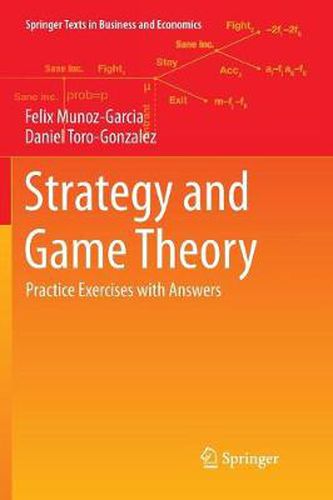Readings Newsletter
Become a Readings Member to make your shopping experience even easier.
Sign in or sign up for free!
You’re not far away from qualifying for FREE standard shipping within Australia
You’ve qualified for FREE standard shipping within Australia
The cart is loading…






This title is printed to order. This book may have been self-published. If so, we cannot guarantee the quality of the content. In the main most books will have gone through the editing process however some may not. We therefore suggest that you be aware of this before ordering this book. If in doubt check either the author or publisher’s details as we are unable to accept any returns unless they are faulty. Please contact us if you have any questions.
This textbook presents worked-out exercises on game theory with detailed step-by-step explanations. While most textbooks on game theory focus on theoretical results, this book focuses on providing practical examples in which students can learn to systematically apply theoretical solution concepts to different fields of economics and business. The text initially presents games that are required in most courses at the undergraduate level and gradually advances to more challenging games appropriate for masters level courses. The first six chapters cover complete-information games, separately analyzing simultaneous-move and sequential-move games, with applications in industrial economics, law, and regulation. Subsequent chapters dedicate special attention to incomplete information games, such as signaling games, cheap talk games, and equilibrium refinements, emphasizing common steps and including graphical illustrations to focus students’ attention on the most relevant payoff comparisons at each point of the analysis. In addition, exercises are ranked according to their difficulty, with a letter (A-C) next to the exercise number. This allows students to pace their studies and instructors to structure their classes accordingly. By providing detailed worked-out examples, this text gives students at various levels the tools they need to apply the tenets of game theory in many fields of business and economics. This text is appropriate for introductory-to-intermediate courses in game theory at the upper undergraduate and master’s level.
$9.00 standard shipping within Australia
FREE standard shipping within Australia for orders over $100.00
Express & International shipping calculated at checkout
This title is printed to order. This book may have been self-published. If so, we cannot guarantee the quality of the content. In the main most books will have gone through the editing process however some may not. We therefore suggest that you be aware of this before ordering this book. If in doubt check either the author or publisher’s details as we are unable to accept any returns unless they are faulty. Please contact us if you have any questions.
This textbook presents worked-out exercises on game theory with detailed step-by-step explanations. While most textbooks on game theory focus on theoretical results, this book focuses on providing practical examples in which students can learn to systematically apply theoretical solution concepts to different fields of economics and business. The text initially presents games that are required in most courses at the undergraduate level and gradually advances to more challenging games appropriate for masters level courses. The first six chapters cover complete-information games, separately analyzing simultaneous-move and sequential-move games, with applications in industrial economics, law, and regulation. Subsequent chapters dedicate special attention to incomplete information games, such as signaling games, cheap talk games, and equilibrium refinements, emphasizing common steps and including graphical illustrations to focus students’ attention on the most relevant payoff comparisons at each point of the analysis. In addition, exercises are ranked according to their difficulty, with a letter (A-C) next to the exercise number. This allows students to pace their studies and instructors to structure their classes accordingly. By providing detailed worked-out examples, this text gives students at various levels the tools they need to apply the tenets of game theory in many fields of business and economics. This text is appropriate for introductory-to-intermediate courses in game theory at the upper undergraduate and master’s level.